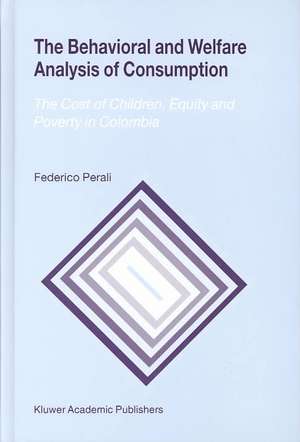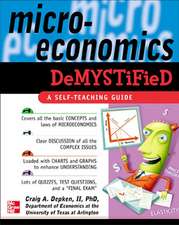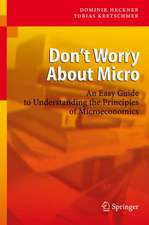The Behavioral and Welfare Analysis of Consumption: The Cost of Children, Equity and Poverty in Colombia
Autor Federico Peralien Limba Engleză Hardback – 30 sep 2003
| Toate formatele și edițiile | Preț | Express |
|---|---|---|
| Paperback (1) | 645.96 lei 6-8 săpt. | |
| Springer Us – 7 dec 2010 | 645.96 lei 6-8 săpt. | |
| Hardback (1) | 652.49 lei 6-8 săpt. | |
| Springer Us – 30 sep 2003 | 652.49 lei 6-8 săpt. |
Preț: 652.49 lei
Preț vechi: 767.63 lei
-15% Nou
Puncte Express: 979
Preț estimativ în valută:
124.86€ • 130.62$ • 103.72£
124.86€ • 130.62$ • 103.72£
Carte tipărită la comandă
Livrare economică 02-16 aprilie
Preluare comenzi: 021 569.72.76
Specificații
ISBN-13: 9781402075186
ISBN-10: 1402075189
Pagini: 408
Ilustrații: XXVIII, 380 p.
Dimensiuni: 155 x 235 x 27 mm
Greutate: 0.75 kg
Ediția:2003
Editura: Springer Us
Colecția Springer
Locul publicării:New York, NY, United States
ISBN-10: 1402075189
Pagini: 408
Ilustrații: XXVIII, 380 p.
Dimensiuni: 155 x 235 x 27 mm
Greutate: 0.75 kg
Ediția:2003
Editura: Springer Us
Colecția Springer
Locul publicării:New York, NY, United States
Public țintă
ResearchCuprins
I: Theory.- 1 A Demographically Modified Demand Model: Behavioral and Welfare Properties.- 2 Demographics and Quality: Household Production Theory and the “Repackaging Model” Revisited.- 3 Household Equivalence Scales and Interpersonal Comparisons.- II: Econometric Applications.- 4 Estimation of a Censored Demand System.- 5 Indexes of Characteristics: Income and Substitution Effects.- 6 The Cost of Children and The Distribution of Welfare.- III: Policy Applications.- 7 Microsimulations of Poverty and Inequality Using the Distribution of Welfare.- 8 Equity Versus Efficiency in Colombia During the Second Half of the 1980s.- 9 Conclusions.- Annex.- Annex: Issues in Data Management of Expenditure Surveys and Non-Parametric TOOLS.- 1. Introduction.- 2. Relevant Information about Expenditure Surveys.- 3. The Estimation of Prices.- 4. Total Expenditure versus Income.- 5. Data Description Using Non-Parametric and Semiparametric Techniques.- 5.1 Non-Parametric Densities, Kernel and Local Polynomial Regressions.- 5.2 Semiparametric Analysis.- 5.3 Non-Parametric Derivatives.- 5.4 Non-Parametric Estimation of the Rank of Demand Systems.- 6 Summary and Remarks.- Appendix: Commodity Aggregation, Demographics and Other Exogenous Information.- Selected Bibliography.- Author Index.
Notă biografică
Federico Perali is a Professor of Political Economy at the University of Verona, where he teaches Political Economy, Development Economics and Welfare Economics. He is also a founding member of the Center for Household, Income, Labor and Demographic Economics - CHILD, and has been a consultant for the World Bank, FAO, Unicef, the Italian Poverty Commission and the Pontifical Council for Justice and Peace.












